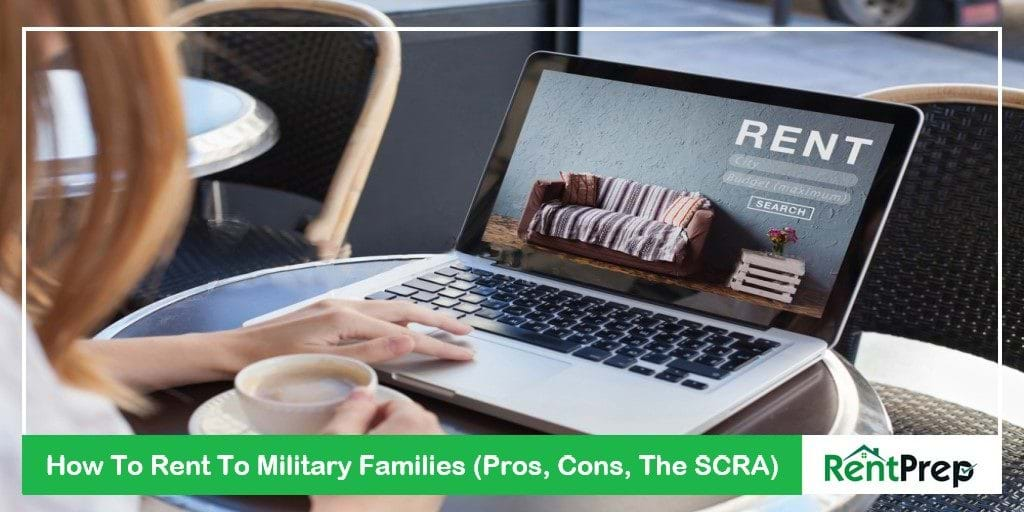
Service people do a great deal for the country. Ultimately, their families are just like other families that work jobs, eat dinner, go to school, and sometimes, rent houses. The big difference when it comes to renting to military tenants that landlords need to be aware of lies in the special protection laws that can affect your lease terms.
Due to the nature of their job, service members are entitled to these protections to ensure they will not be left responsible for large sums on leases that they can’t break when they need to leave town suddenly.
Do you understand the Servicemembers Civil Relief Act (SCRA) and how it can affect your business? Do you know how to rent to military families in a way that won’t ruin your bottom line? Today, we’ll help you learn just that.
Renting to military families is a great thing to do, but you need to set yourself up for success when working with the special circumstances that these families are sure to encounter.
A Table Of Contents On How To Rent To Military Families
- The Pros of Renting A House To Military Personnel
- The Cons of Renting to Military Tenants
- What Is The Servicemembers Civil Relief Act (SCRA)?
- SCRA Exceptions & Waivers
The Pros Of Renting A House To Military Personnel
Renting to military personnel is a wonderful thing to do. Service people working in the military are willing to do a job that many are not willing to do. It’s possible that these personnel might even be some of the best tenants that you ever have.
 Here are just a few reasons that renting to a military family can be a great thing:
Here are just a few reasons that renting to a military family can be a great thing:
- They have a reliable source of income.
- They may be hard-working and diligent.
- They have a built-in support system if they fall on hard times.
- They may be cleaner than many other tenants.
- They support the local economy.
- They can recommend your properties to other military families.
Of course, all of these reasons are going to depend on the specific tenants you are working with. Generally speaking, however, service tenants tend to be great tenants. Still, you will want to screen them just as thoroughly as you would screen any other potential tenant before you accept their application!
The Cons Of Renting To Military Tenants
There are, of course, some potential drawbacks to renting to military families as well. The biggest drawback is the fact that many military families can be moved with very little notice or they may even fall behind on paying rent due to deployment timing and other issues.
In a standard lease, you could then challenge the tenant for their payments or their broken lease. When it comes to a military tenant, however, the law offers special protections that will leave you without any payback when these issues arise.
What Is The Servicemembers Civil Relief Act (SCRA)?
The Servicemembers Civil Relief Act (SCRA) is a set of laws that help to ensure that military rental tenants are able to handle moves, deployments, and other housing issues caused by their job without a huge financial burden being placed on them.
The SCRA program offers the following types of protections for service members while on active duty:
- Cannot be evicted unless rent is over $3,851.03 per month in 2019 (this amount is updated yearly)
- No foreclosures without a court order
- No vehicle repossessions as long as a payment or deposit was made before joining the military
- Storage facilities cannot sell belongings to cover overdue rent without a court order
- Civil proceeding trials must be delayed
The first point is the one most relevant to landlords like you. If you have a military tenant that is paying less than the aforementioned amount per month and they are on active duty, you cannot evict them.
SCRA has a number of other benefits that allow active, deployed, and frequently moved military personnel to be able to cancel contracts, leases, and other obligations that would not be easy to break with the law.
Ending A Lease Early
 One benefit that military personnel can use is that they can end their housing lease without any penalties if they are deployed for more than 90 days.
One benefit that military personnel can use is that they can end their housing lease without any penalties if they are deployed for more than 90 days.
This means that you could suddenly be left without a tenant on little notice, with little hope of seeing any type of rent or compensation for the move out because of the protections of the SCRA.
While these protections are wonderful things for military families, landlords need to be careful and be prepared for this possibility at any time. As you will not be able to keep their security deposit to cover the rent in this type of situation, you should always be prepared to cover these gaps.
SCRA Exceptions & Waivers
There are some exceptions to the SCRA.
The first we have already mentioned. If a tenant is paying more than $3,851.03 in rent, they are not eligible for the SCRA protections.
Second, military reservists and any “drilling status” members of the National Guard are not included in the SCRA coverage. If, however, National Guard members are sent out to help with a national emergency, they will be covered under the terms of the SCRA rules.
Finally, it is possible to ask a tenant to sign a waiver that would take away their SCRA rights. Keep in mind, however, that not all states will allow these rights to be waived. You should know your local guidelines if you plan to use this type of waiver as a part of your lease agreement.
State Laws
The SCRA is a set of federal laws, but many states have additional laws about military rentals. In some cases, these laws are even more detailed than the federal laws. Before you set up a lease to use with military families or plan to manage a property in a military-heavy area, be sure that you are up-to-date with the local laws that provide housing protections to service members.
Military Tenants: Good to Go!
The SCRA makes it possible for active duty military tenants to be able to leave for their deployment without the risk of being taken to court for breaking their lease. While that protection is, in some ways, a big drawback for renting to military tenants, the potential loss of renting to military families is easily balanced out by the benefits of doing so.
It’s important to be aware of the SCRA and how it can affect your rental business so that you can prepare in advance to mitigate any losses, but it is in no way a reason to avoid renting to military tenants altogether!

